Watermelon is a hydrating, nutrient-dense fruit that may support heart health, digestion, muscle recovery, and overall wellness.
Packed with over 90% water and rich in antioxidants like lycopene and vitamin C, watermelon is one of nature’s best functional foods. Understanding its benefits helps you make informed choices for a balanced, science-backed diet.
From supporting healthy blood pressure to improving skin hydration, let’s explore how this refreshing fruit nourishes your body — backed by current research and expert sources like the Mayo Clinic and Harvard Health Publishing.
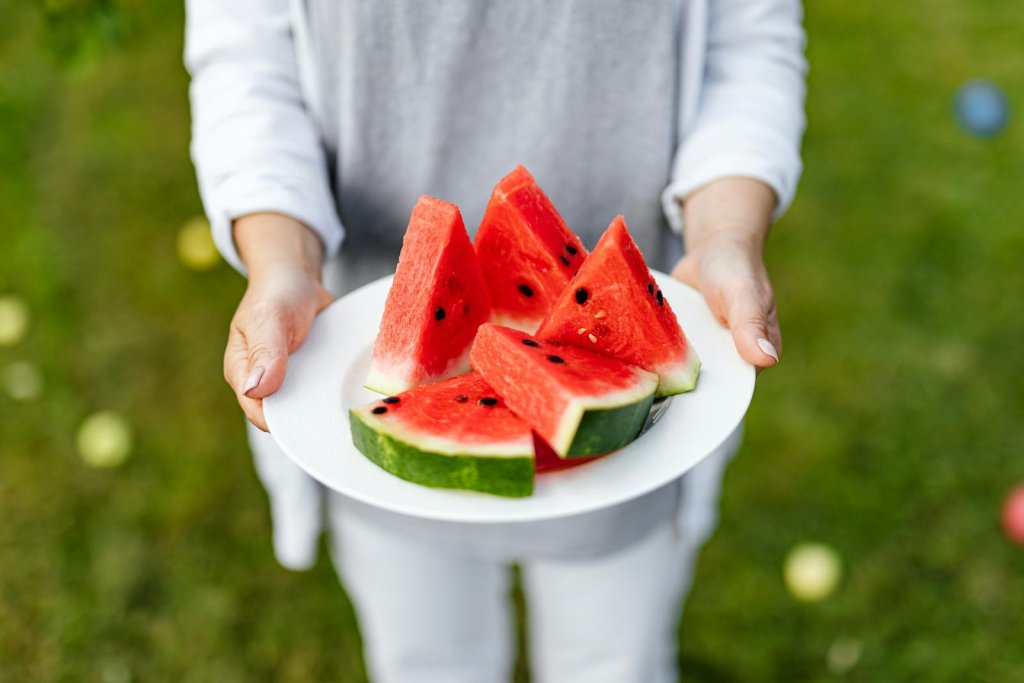
What Makes Watermelon So Healthy?
Watermelon is one of the most nutrient-rich and hydrating fruits in the world — composed of about 92% water and a powerful mix of vitamins, minerals, and antioxidants that support overall wellness.
A single cup of diced watermelon (about 150 g) provides only 46 calories, yet delivers a surprising amount of essential nutrients, including:
- Vitamin C – supports immune defense and collagen formation for skin health.
- Vitamin A (beta-carotene) – promotes eye and skin health by supporting cell renewal.
- Potassium – helps maintain fluid balance and normal blood pressure.
- Magnesium and B Vitamins – contribute to energy production and muscle function.
- Lycopene – a powerful antioxidant that may help protect cells from oxidative damage.
- L-citrulline – an amino acid that supports circulation and muscle recovery.
- Fiber – supports digestive health and satiety.
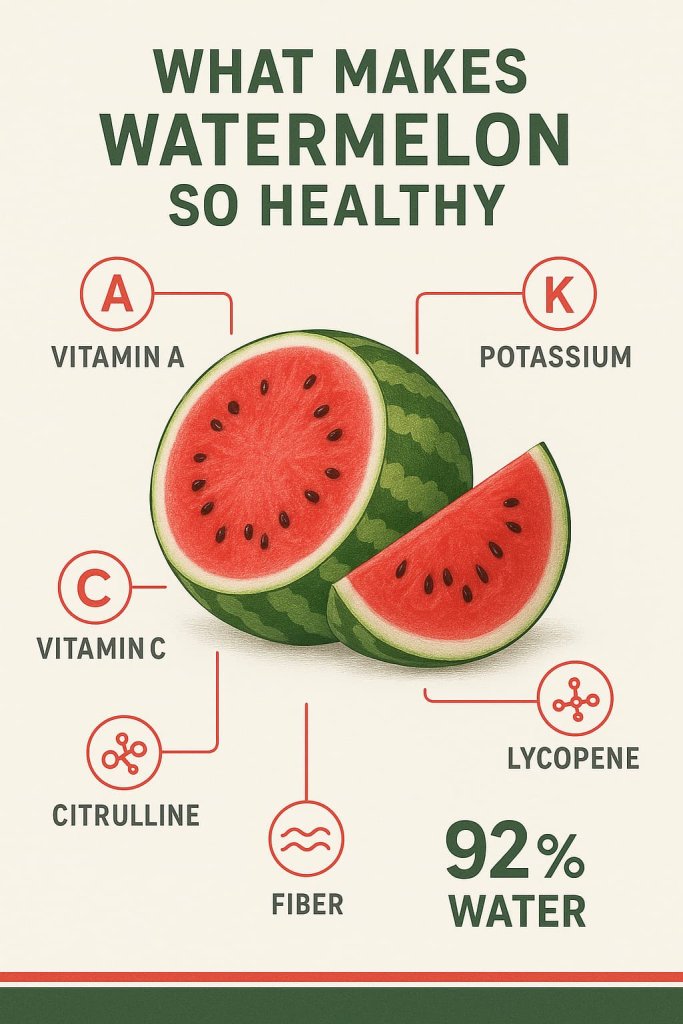
According to the USDA FoodData Central, watermelon’s nutrient profile makes it both low in calories and high in essential micronutrients — ideal for hydration, metabolism, and antioxidant protection.
Additionally, research published in the National Health and Nutrition Examination Survey (NHANES, 2022) found that people who consumed watermelon regularly had better diet quality, higher vitamin and antioxidant intake, and lower body weight than non-consumers.
Because of this unique combination of hydrating fluids, natural sugars, and protective phytonutrients, watermelon is often classified as a functional food — one that may support heart, skin, digestive, and metabolic health when included as part of a balanced diet.
(Sources: USDA FoodData Central, 2024; Mayo Clinic Health System, 2024; NHANES, 2022.)
10 Proven Health Benefits of Watermelon (Science-Based)
Watermelon is more than just a refreshing summer fruit — it’s a powerhouse of hydration, antioxidants, and nutrients that support your heart, muscles, skin, and digestion. Backed by scientific studies, here are ten research-based reasons to enjoy this hydrating fruit as part of a balanced diet.
1. Excellent Source of Hydration
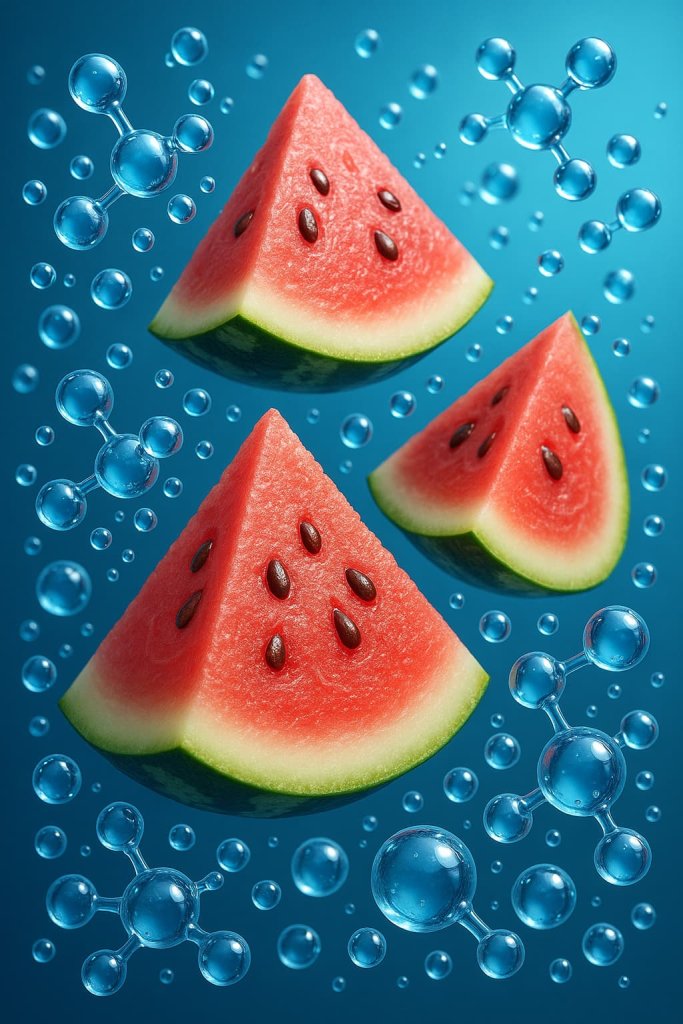
Watermelon is composed of about 92% water, making it one of the most hydrating fruits available. Proper hydration supports temperature regulation, circulation, and digestion, while also maintaining healthy skin.
According to the Mayo Clinic Health System, eating high-water fruits like watermelon helps replenish body fluids and electrolytes naturally — especially during heat exposure or exercise. This makes it a smarter alternative to sugary sports drinks.
Tip: Eat chilled watermelon cubes, or blend them into smoothies for natural hydration without added sugar.
2. Supports Heart Health
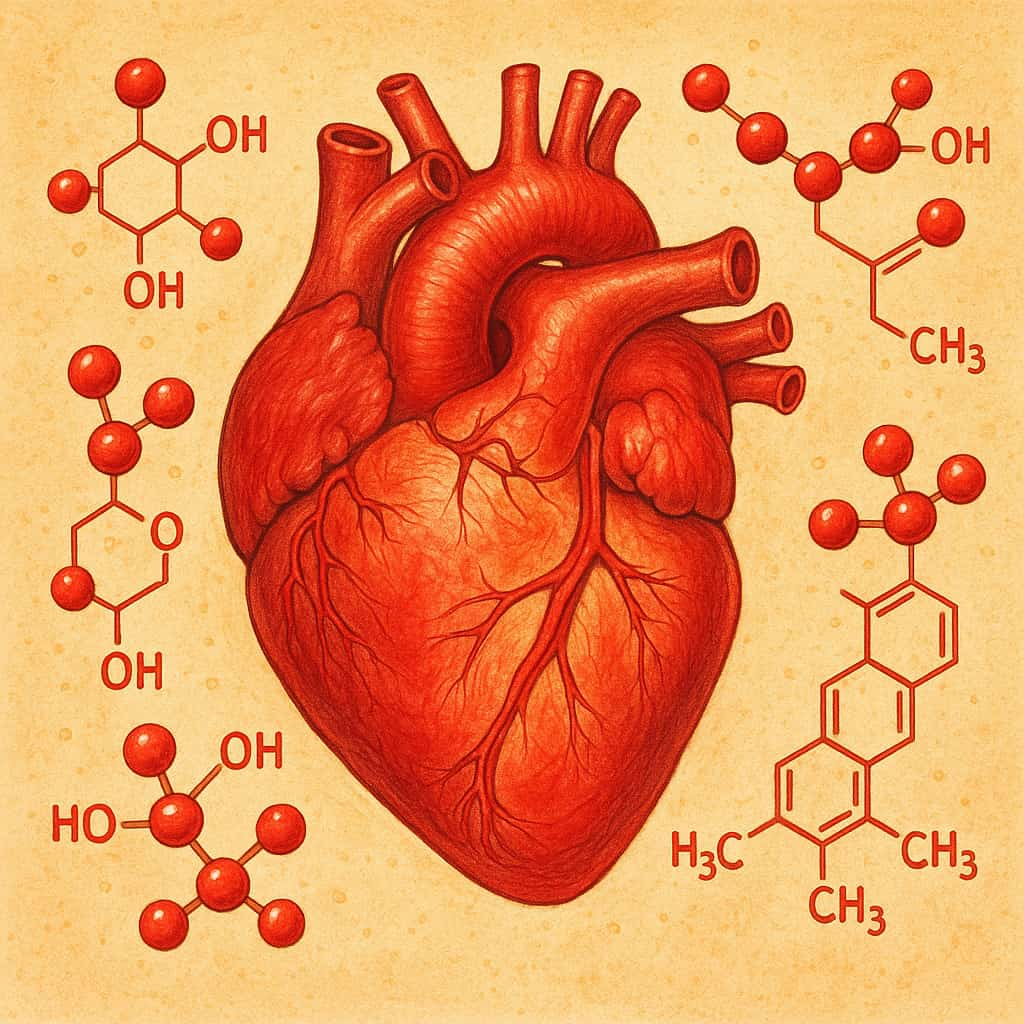
Watermelon is rich in lycopene, citrulline, and potassium — three compounds that collectively support cardiovascular wellness.
- Lycopene, the antioxidant responsible for watermelon’s red color, may help reduce oxidative stress and LDL (“bad”) cholesterol levels.
- Citrulline, an amino acid, supports nitric oxide production, helping relax blood vessels and promote healthy blood pressure.
- Potassium aids in electrolyte balance and heart rhythm stability.
A 2023 review in Current Atherosclerosis Reports found that higher dietary lycopene intake was linked to improved vascular function and a lower risk of cardiovascular disease. For an in-depth overview, see Harvard T.H. Chan School of Public Health – Lycopene and Heart Health.
3. May Support Muscle Recovery

Watermelon juice is a natural source of L-citrulline, an amino acid that may help reduce post-exercise muscle soreness and support circulation. Once ingested, citrulline converts to arginine, which helps produce nitric oxide — improving oxygen delivery to muscles.
A study in the Journal of Agricultural and Food Chemistry (2019) found that athletes who consumed watermelon juice before intense workouts experienced less muscle soreness and quicker recovery.
Pro Tip: Drink a glass of fresh watermelon juice about 30 minutes before or after your workout for optimal hydration and recovery.
4. Rich in Antioxidants
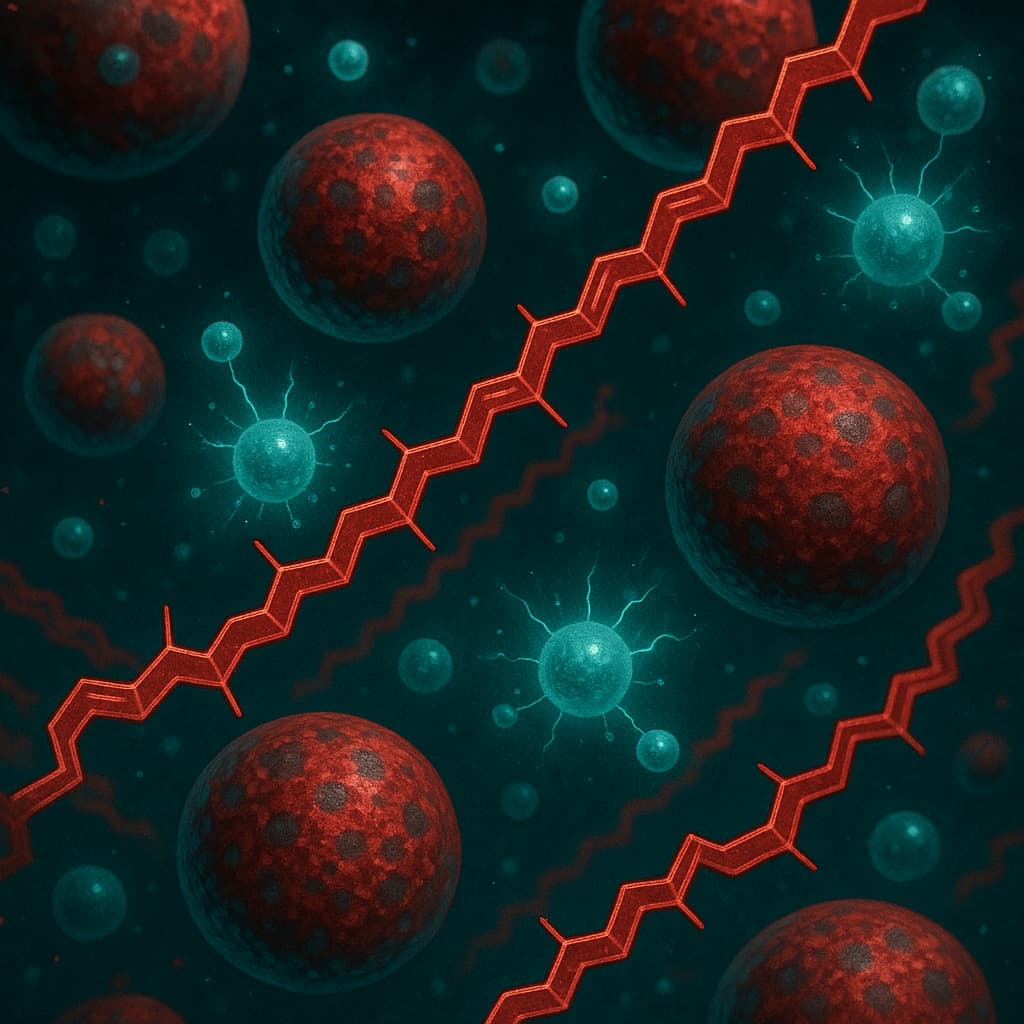
Watermelon is a rich source of antioxidants including lycopene, vitamin C, beta-carotene, and polyphenols, all of which help combat oxidative stress and inflammation.
Antioxidants support immune health and cellular protection from free radicals — molecules linked to aging and chronic disease.
According to the Cleveland Clinic, antioxidant-rich diets may support immune defense, vascular health, and overall longevity.
5. May Aid Weight Management
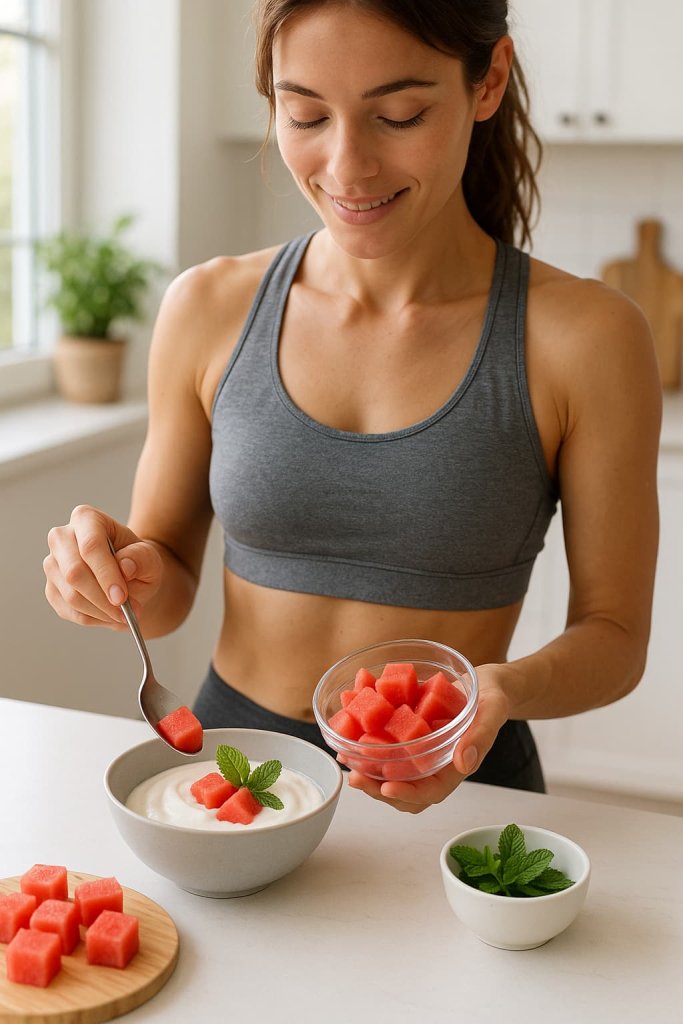
Low in calories (about 30 kcal per 100 g) and rich in water and fiber, watermelon can help promote fullness and reduce calorie intake.
A 2022 National Health and Nutrition Examination Survey (NHANES) analysis found that adults who regularly consumed watermelon had higher nutrient intake, better hydration, and lower body weight compared to non-consumers.
Swapping processed snacks or desserts with watermelon slices can help manage appetite naturally while satisfying your sweet cravings.
6. Supports Digestive Health
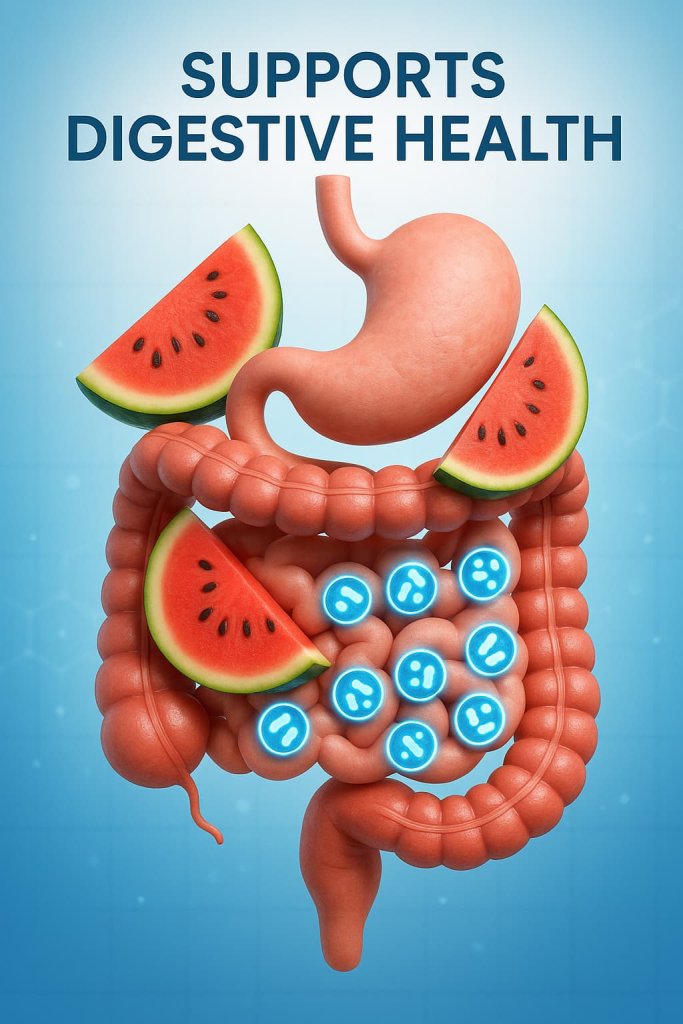
Hydration and fiber work together to promote healthy digestion — and watermelon offers both. Each serving provides small but valuable amounts of fiber and natural water, which help maintain bowel regularity and support the gut microbiome.
Consuming watermelon with fiber-rich foods such as oats, yogurt, or chia seeds further supports healthy digestion and gut balance. For more on digestive wellness, see Harvard Health Publishing – Digestive Health.
7. Promotes Skin and Hair Health

Watermelon is naturally rich in vitamin A, vitamin C, and lycopene — three nutrients that play essential roles in maintaining healthy, radiant skin and strong hair.
- Vitamin C supports the body’s natural production of collagen, the structural protein that keeps skin firm, smooth, and elastic.
- Vitamin A contributes to skin cell renewal and helps maintain the integrity of the skin’s outer barrier, reducing dryness and flakiness.
- Lycopene, a potent antioxidant found in watermelon’s red flesh, helps protect skin from oxidative stress caused by sun exposure and pollution.
According to the American Academy of Dermatology Association (AAD), a diet rich in vitamins A and C from whole foods like fruits and vegetables supports collagen formation, enhances skin texture, and promotes a youthful appearance. The AAD emphasizes that nutrient-dense foods — not supplements — are the best way to obtain these skin-supportive antioxidants.
Regularly eating watermelon, along with other colorful produce, may support skin hydration, protect against oxidative damage, and provide nutrients that help maintain healthy hair growth and strength.
(Source: American Academy of Dermatology Association, 2024; NIH Office of Dietary Supplements – Vitamin A & C Fact Sheets)
8. Supports Eye Health
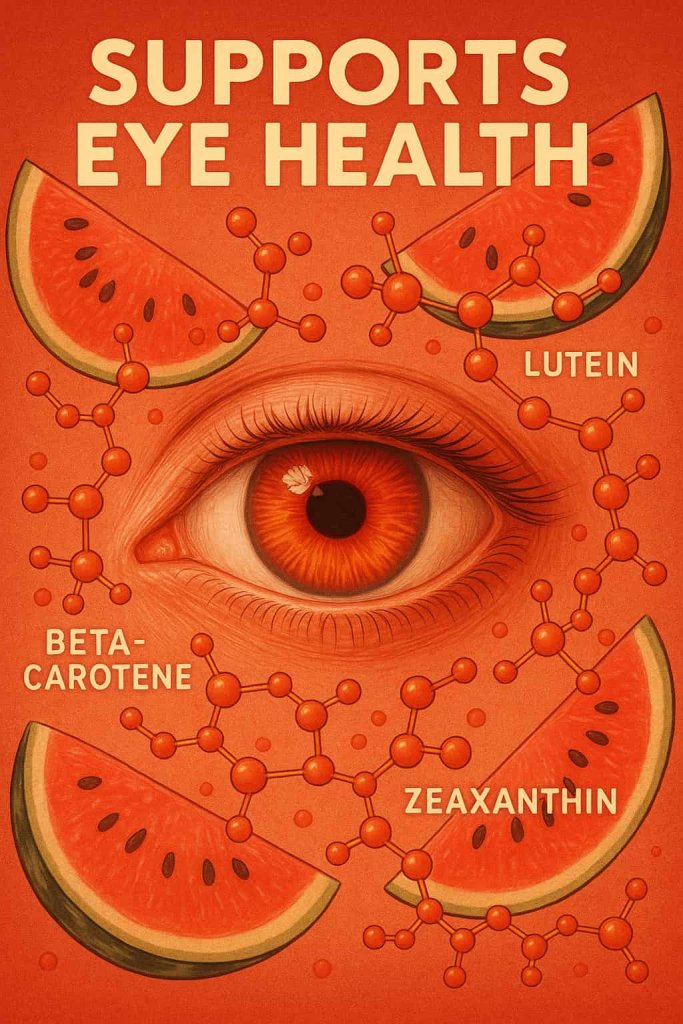
Watermelon provides beta-carotene, lutein, and zeaxanthin, carotenoids that may support healthy vision and protect against oxidative damage to the eyes.
These nutrients work together to filter harmful light wavelengths and support visual clarity.
For more details, visit the NIH Office of Dietary Supplements – Vitamin A Fact Sheet.
9. May Support Healthy Blood Pressure
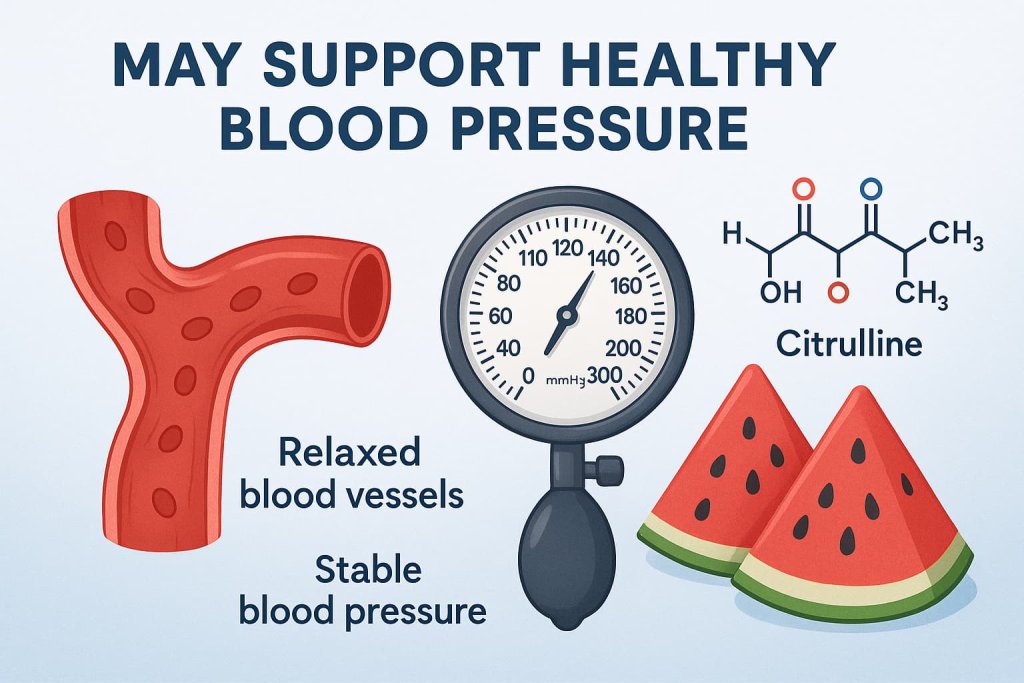
The citrulline and potassium in watermelon play complementary roles in blood pressure regulation. Citrulline helps relax blood vessels, while potassium helps balance sodium levels.
A 2023 Journal of Hypertension study reported that citrulline supplementation improved arterial elasticity in adults with mildly elevated blood pressure. Including watermelon regularly in your diet may therefore support vascular relaxation and circulatory function naturally.
10. May Support Metabolic and Immune Function
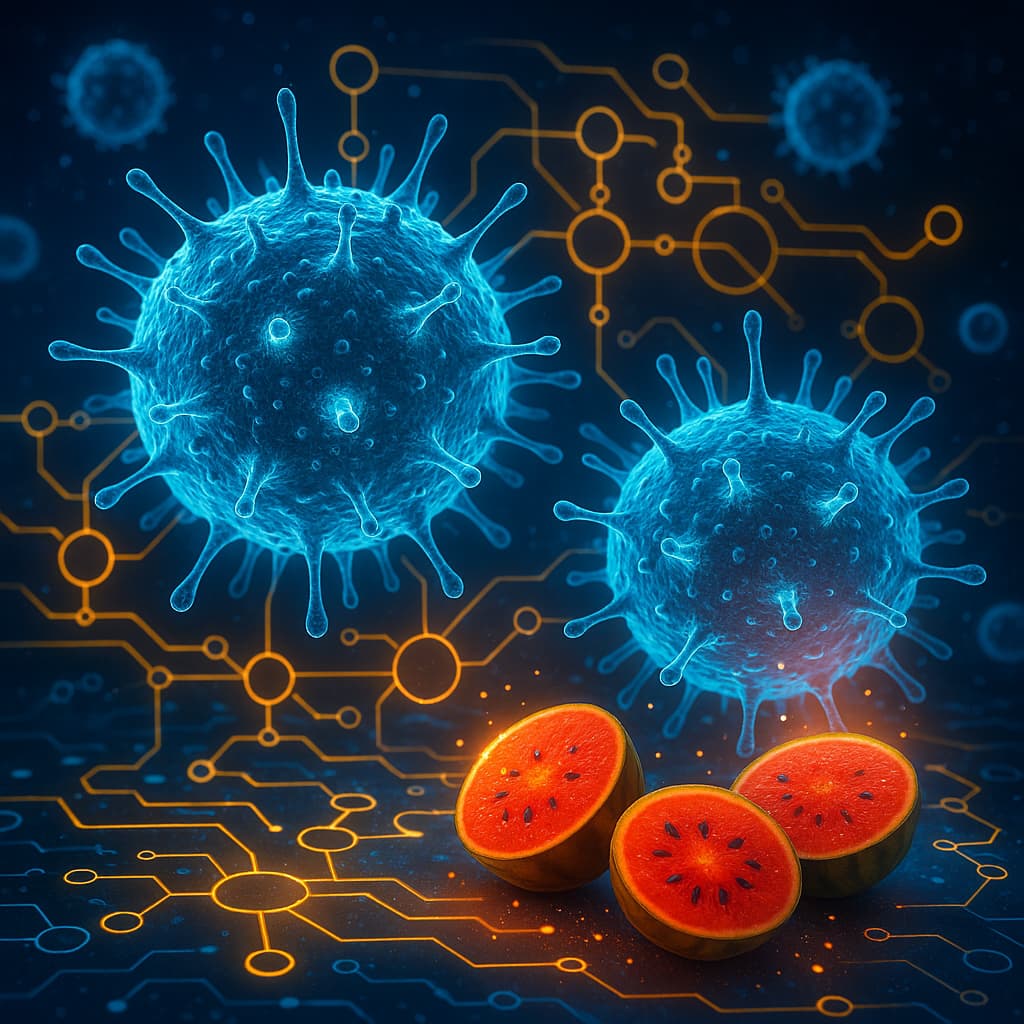
Watermelon contains B-vitamins, magnesium, and vitamin C, all of which play vital roles in energy metabolism and immune defense.
Vitamin C and antioxidants support immune response, while B-vitamins help convert food into usable energy.
According to the Harvard School of Public Health, foods high in vitamin C support immune cell function and help reduce oxidative stress throughout the body.
Regularly adding watermelon to meals or snacks may help sustain metabolic balance, hydration, and overall vitality.
Nutritional Profile of Watermelon (per 100 g)
Watermelon is remarkably low in calories yet rich in hydration, electrolytes, and antioxidants. According to the USDA FoodData Central (2024), here’s the updated nutritional breakdown for 100 grams of raw watermelon:
| Nutrient | Amount (per 100 g) | % Daily Value* |
|---|---|---|
| Calories | 30 kcal | 1% |
| Water | 91.5 g | — |
| Carbohydrates | 7.5 g | 3% |
| Sugars (natural fructose) | 6.2 g | — |
| Fiber | 0.4 g | 1% |
| Protein | 0.6 g | 1% |
| Fat | 0.2 g | <1% |
| Vitamin C | 8.1 mg | 9% |
| Vitamin A (as beta-carotene) | 28 µg | 3% |
| Potassium | 112 mg | 2% |
| Magnesium | 10 mg | 3% |
| Lycopene | 4,500 µg | — |
*Percent Daily Values are based on a 2,000-calorie diet.
Watermelon’s nutritional density makes it a functional, hydrating fruit that supports metabolism, immune defense, and cardiovascular function — all while being naturally low in calories and fat.
How to Eat Watermelon for Maximum Benefits
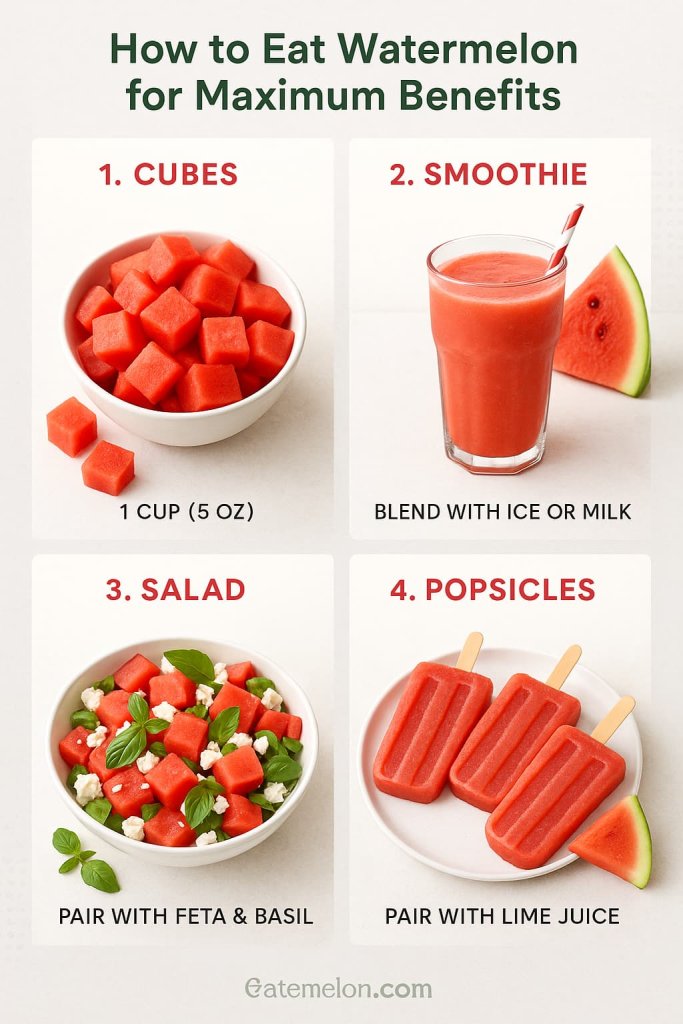
To get the most from watermelon’s hydrating and antioxidant properties, enjoy it in moderation and with balanced pairings.
Best Ways to Enjoy:
- Fresh cubes or slices: A simple, refreshing snack for hydration.
- Smoothies or juices: Blend with cucumber, mint, or lemon for post-workout recovery.
- Salads: Combine diced watermelon with feta cheese, cucumber, and basil for a nutrient-rich summer salad.
- Frozen snacks: Make watermelon popsicles or sorbets for a low-calorie dessert alternative.
Ideal Portion Size:
- 1–2 cups (150–300 g) per serving is ideal for most adults.
- This provides hydration and nutrients without excessive sugar intake.
Expert Tip:
Pair watermelon with protein or fiber-rich foods (like Greek yogurt, chia seeds, or nuts) to stabilize blood sugar and extend satiety.
For optimal heart and hydration benefits, the Mayo Clinic Health System recommends eating hydrating fruits like watermelon daily during hot or active periods.
Storage and Food Safety Tips
Proper handling and storage are essential to preserve nutrients and prevent foodborne illness. According to the U.S. FDA Produce Safety Guidelines (2024):
- Before Cutting: Rinse the outer rind thoroughly under running water to remove dirt and bacteria.
- After Cutting: Refrigerate immediately at ≤ 40°F (4°C) in airtight containers.
- Shelf Life: Consume within 3–4 days for best taste and nutritional retention.
- Whole Storage: Uncut watermelon can be stored at room temperature for up to one week.
Avoid leaving sliced watermelon at room temperature for more than 2 hours, as bacterial growth can occur rapidly in moist environments.
Possible Side Effects and Precautions
While watermelon is generally safe and nutritious for most people, moderation and awareness are key — particularly for those with certain health conditions.
1. Blood Sugar Considerations
Watermelon has a high glycemic index but a low glycemic load, meaning it can raise blood sugar quickly in large portions.
→ People with diabetes should limit intake to small servings (1 cup) and pair it with protein or fiber.
Source: Cleveland Clinic – Watermelon and Blood Sugar.
2. Potassium and Kidney Health
Watermelon naturally contains potassium, which supports heart and nerve function.
→ However, individuals with kidney disease or those on potassium-restricted diets should monitor intake to avoid hyperkalemia.
Reference: NIH Office of Dietary Supplements – Potassium Fact Sheet.
3. Overconsumption Effects
Eating large amounts (over 4 cups daily) may lead to bloating, digestive discomfort, or loose stools due to excess water and fructose.
Moderation ensures all benefits without unwanted side effects.
Frequently Asked Questions (FAQ)
1. Can I eat watermelon every day?
Yes — for most people, 1–2 cups per day is safe and beneficial. It supports hydration, heart function, and vitamin intake.
2. Is watermelon good for diabetics?
Yes, in controlled portions. It’s low in calories and has a low glycemic load, but pair it with protein or fiber to maintain stable blood sugar.
3. Does watermelon support weight loss?
It may help. Watermelon is low in calories and high in water and fiber, which promote fullness and reduce appetite.
4. What’s the best time to eat watermelon?
Mid-morning or post-workout — when hydration and energy replenishment are most beneficial.
5. Can I eat the seeds?
Yes — roasted watermelon seeds are rich in magnesium, iron, and protein.
6. Is it safe during pregnancy?
Yes, in moderate food amounts. Watermelon supports hydration and provides folate and vitamin C beneficial for maternal health.
7. Does watermelon hydrate better than water?
While water remains essential, watermelon provides hydration plus electrolytes and natural sugars, making it excellent for rehydration.
Conclusion
Watermelon is a science-backed, hydrating superfruit loaded with antioxidants, vitamins, and amino acids that may support your heart, skin, metabolism, and overall wellness.
When enjoyed in moderation, it can be a refreshing, nutrient-rich part of a balanced diet.
Eat it fresh, chilled, or blended — and let nature’s most hydrating fruit power your health.
This content is for informational purposes only and not medical advice.
References
- USDA FoodData Central – Watermelon, Raw (2024)
Official nutrient composition data used for the watermelon nutritional table (per 100 g). - Mayo Clinic Health System – The Wonders of Watermelon (2024)
Explains hydration, nutrient profile, and heart-health benefits of watermelon. - U.S. Food and Drug Administration (FDA) – Selecting and Serving Produce Safely (2024)
Provides official watermelon storage and food safety guidelines. - Cleveland Clinic – Health Benefits of Watermelon (2024)
Details how watermelon supports hydration, heart health, digestion, and safe intake for diabetics. - Journal of Agricultural and Food Chemistry – Watermelon Juice and Muscle Soreness (2019)
Peer-reviewed study demonstrating L-citrulline’s role in reducing post-exercise muscle fatigue.
